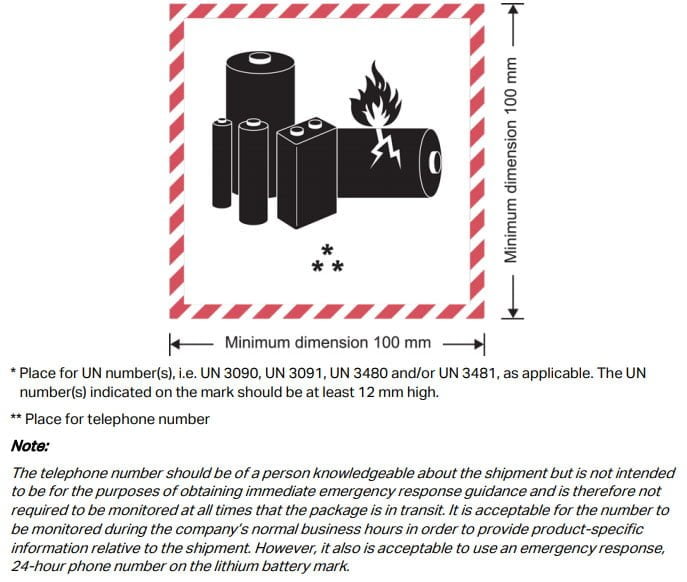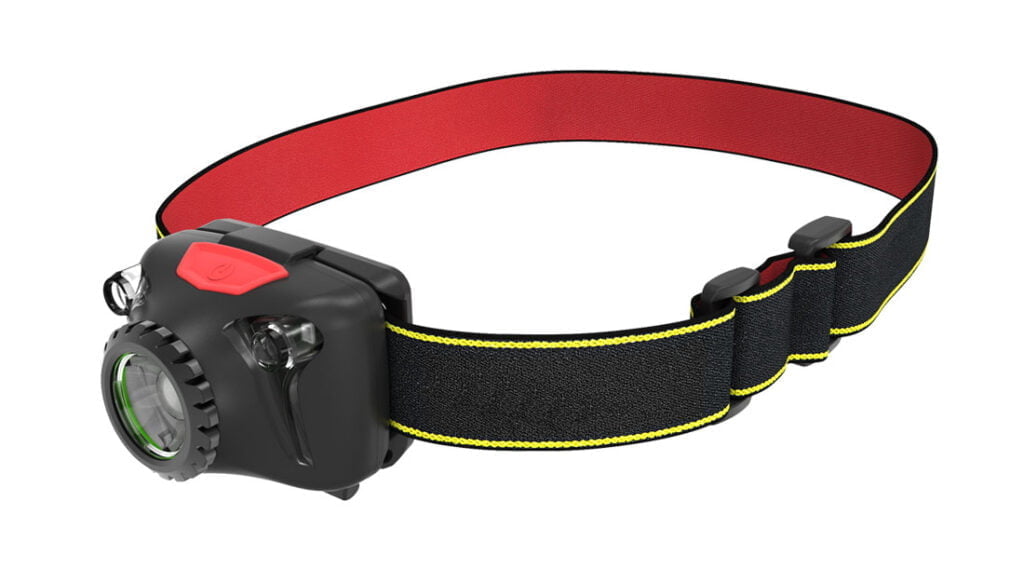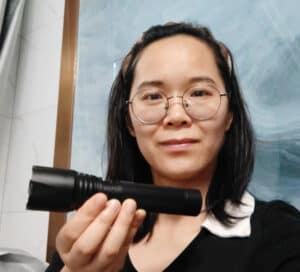Flashlights and headlamps use various types of batteries, but the two most commonly used types on the market are lithium-ion batteries (including lithium polymer batteries) and alkaline batteries. In recent years, nearly 90% of new flashlights and headlamps have been designed with rechargeable lithium-ion batteries. Non-rechargeable alkaline batteries are mainly used for promotions, gifts, or markets in developing countries. Therefore, lithium batteries are the preferred power source for portable electronic devices. It should be noted that all goods carrying lithium-ion batteries must comply with the relevant airline regulations for lithium-ion battery goods during international transportation.
Why are lights with lithium-ion batteries considered dangerous goods?
A lithium-ion battery is a rechargeable battery that uses lithium ions as the primary component of its electrochemistry. It typically consists of two electrodes (a cathode and an anode) separated by an electrolyte, allowing lithium ions to flow between the electrodes during charging and discharging. The use of lithium ions allows for high energy and power densities, making lithium-ion batteries a popular choice for a variety of applications, including portable electronics, electric vehicles, and renewable energy storage systems.
Lithium-ion batteries are considered dangerous goods because they have the potential to cause fire or explosion if they are not designed, manufactured, or handled properly. The electrolyte in lithium-ion batteries is highly flammable, and if the battery is damaged or punctured, it can cause a short circuit, leading to a thermal runaway reaction that generates heat and releases flammable gases. This can result in a fire or explosion.
Additionally, if lithium-ion batteries are exposed to high temperatures or pressure, they can become unstable and pose a risk. Lithium-ion batteries must be handled carefully and transported according to strict regulations to minimize the risk of fire or explosion.
How to ship lights with lithium-ion batteries?
In international transportation, lithium-ion battery goods are generally considered special products, but a portion of lithium-ion batteries with particularly small capacity can also be considered general cargo. Below are two common situations in which you can transport lithium batteries internationally.
Lithium batteries are transported as general cargo.
You can only transport lithium battery goods as general cargo if they meet one of the following requirements:
• UN3480 cells ≤ 30Wh, or batteries ≤ 100Wh.
• UN3481 cells ≤ 30Wh, or batteries ≤ 100Wh.
• UN3090 lithium metal cells with a lithium content ≤ 1g, or batteries with a lithium content ≤ 2g.
Lithium batteries are transported as dangerous goods.
Lithium battery goods can be transported as dangerous goods by air, sea, land, and express delivery. You must package and label your lithium battery products in accordance with dangerous goods regulations. The following are some types of lithium batteries, and you can use the corresponding UN number to ship them:
• UN3090 lithium metal batteries
• UN3480 lithium-ion batteries
• UN3091 lithium metal batteries contained in equipment
• UN3091 lithium metal batteries packed with equipment
• UN3481 lithium-ion batteries contained in equipment
• UN3481 lithium-ion batteries packed with equipment.
What certifications are needed to transport lights with lithium-ion batteries internationally?
You need more certifications than regular cargo to safely and legally transport lithium battery cargo. Here are some of the certifications you need.
UN38.3 Certification
UN38.3 Certification is an international safety and performance testing. Lithium batteries must meet United Nations standards for safe transport. Whenever your cargo contains lithium batteries, whether installed in the device or packaged with it, you need to do a UN38.3 test.
According to UN38.3, if the device has no lithium battery installed and each package contains more than 24 cells or 12 battery packs, it must also pass the 1.2m free fall test. In addition, if batteries are shipped separately, the gross weight of each package should not exceed 10 kilograms.
You can find a third-party testing agency designated by the Civil Aviation Administration or a battery manufacturer with testing capability.
Material Safety Data Sheet (MSDS)
We can also refer to it as a chemical safety specification or a chemical safety data specification. It tells us how dangerous the product is, how to use it safely, how to handle accidents, etc. Usually, your supplier or manufacturer will provide a Material Safety Data Sheet.
However, to ensure the accuracy and standardization of the report, you can ask a professional agency to write it.
Cargo Safety Transportation Report
You need this report if you ship lithium-ion batteries by air or sea from China (not including Hong Kong). Before applying for the report, you need a UN38.3 test report. With Un38.3, you can go to a hazardous materials management agency to get the Cargo Safety Transportation Report. The standards and requirements of the report are based on IATA’s DGR, IMDG Code, MSDS, GB Hazardous Materials List, etc.
If you import lithium batteries from China, research institutes such as the Shanghai Institute of Chemistry, Qingdao State Administration of Work Safety Chemical Identification Center and other chemical research institutes can provide the report.
Export Cargo Packaging Function Inspection Certificate (1.2-meter drop test report)
This packaging certificate is required for air and sea shipping of lithium batteries. The certificate shows that the lithium battery has been properly packaged according to the requirements. This is very important, as proper packaging can avoid potential accidents during transportation.
You need to provide the certificate when booking shipments for lithium battery goods and handling hazardous materials declarations. Without it, your goods will be prohibited from export. However, if you are shipping lithium battery samples by air, your manufacturer may refuse to provide the certificate due to small quantities. You can package your goods with a United Nations-certified inspection-free box. In this case, you do not need to provide the certificate.
Typically, manufacturers apply for inspection certificates from the local inspection agency. It takes 5 to 7 working days, up to two weeks. However, you can get more within 3 to 5 working days if you pay more. Obtaining this certificate is a bit complicated and requires other certificates mentioned above.
Here’s an example for your reference. If you place a large order for lithium batteries in China, the manufacturer must package your product after the battery production is completed. Since lithium batteries belong to class 9 hazardous materials, the manufacturer purchases compliant United Nations packaging boxes from a certified packaging factory. The box must have a United Nations symbol and code. Then the packaging factory provides a packaging performance report.
Next, the lithium battery manufacturer applies for a hazard classification report from the local authority. You can obtain information such as the United Nations number, category, and packaging group of the inspection certificate. For example, UN3480, Class 9, Packaging Group II.
Finally, the lithium battery production company provides the packaging performance report, hazardous materials classification report, MSDS, hazardous materials business production qualifications, etc., to the local inspection agency. Generally, people from the bureau will go to the factory warehouse to inspect the goods and check the product quantity, packaging group, UN number, hazardous material label, etc. If everything is normal, they will give you the certificate.
How to pack lights with lithium-ion batteries?
If your lithium battery product has passed the above tests, you have properly packaged and labelled the goods. Here’s detailed information on how to package and label:
- Pack each light with battery inside or outside of light are all ok. But two or more batteries should not touch each other to prevent a collision.
- The packaging should be sturdy enough to prevent bursting during transportation and equipped with effective measures to prevent short circuits.
- Attach the 9 hazard labels and UN number to the outer packaging. Attach the “CARGO AIRCRAFT ONLY” label if you use air transport as below.

Conclusion
If you are ready to place an order with your supplier and need to transport goods with lithium-ion batteries, please confirm with your supplier whether they can provide the following information:
- MSDS (provided by the battery manufacturer)
- UN38.3 (provided by a qualified third-party organization)
- Transport conditions identification certificate (provided by a qualified third-party organization)
Our recommendation
Because there are many documents required for the transportation and sale of batteries, and we need to be responsible to consumers for small and medium-sized flashlight or headlamp brands, importers, and retailers, we suggest that we can use the manufacturer’s logo and documents directly, and do not need to attach our own logo to the battery. This will greatly increase the cost as we cannot share the relevant certificates from the manufacturer. Our focus is on selling lights, as long as your logo is on the lights and packaging, and it is not very important whether the battery has your logo or not.


